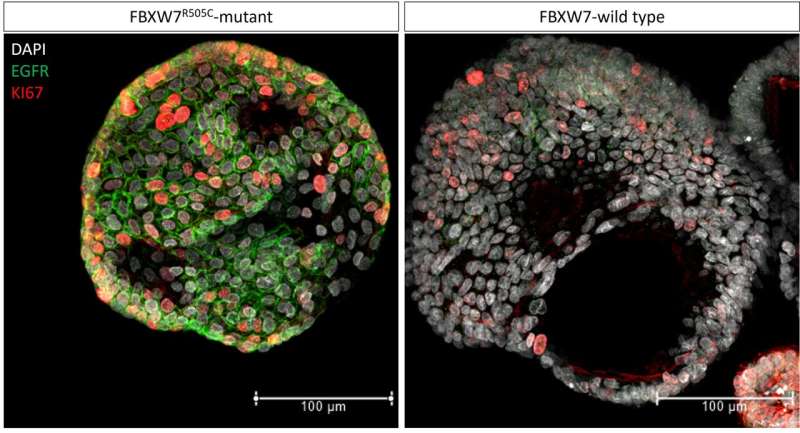This article has been reviewed according to Science X's editorial process and policies. Editors have highlighted the following attributes while ensuring the content's credibility:
fact-checked
trusted source
proofread
Newly discovered link between FBXW7 mutations and EGFR signaling in colorectal cancer

The Organoid group at the Hubrecht Institute has identified a new link between FBXW7 mutations and epidermal growth factor receptor (EGFR) signaling activity. The FBXW7 gene is commonly mutated in colorectal cancer and such mutations have been associated with worse treatment outcomes. The researchers used colon organoids and the CRISPR/Cas9 gene editing technique to investigate the consequences of multiple common FBXW7 mutations.
Further understanding of the link with EGFR signaling could help improve treatment strategies for colorectal cancer. The study is published in the journal Proceedings of the National Academy of Sciences.
Cancer is caused by the accumulation of mutations in different genes. One commonly mutated gene is the FBXW7 gene, which normally plays an important role in the protein degradation system. Although the mutation has been identified in many different types of cancer, it is most often seen in colorectal and endometrial cancer.
For cancer in the colon, FBXW7 mutations are involved in 10% of patients and result in worse treatment outcomes. However, the FBXW7 mutation is not yet well understood, and the reason for the poor treatment outcome is currently unknown. "Therefore, we set out to completely understand the impact of these mutations, hopefully giving us a better idea of how we can treat affected patients," says Matteo Boretto, one of the leading researchers on the project.
Introducing mutations into organoids
To investigate the FBXW7 mutations, the researchers used organoids, which work as miniature organs that can be cultured in the laboratory.
Maarten Geurts, one of the leading researchers on the project, explains, "We used healthy colon organoids, or mini-intestines, as they closely recapitulate the organs in our body and therefore allow us to study health and disease in great detail."
The FBXW7 mutations were introduced through the CRISPR/Cas9 base editing technique. This technique enables the researchers to make specific mutations in the gene by changing the DNA code. Seven different FBXW7 mutations were introduced in the organoids, which constitute the most commonly occurring mutations in the gene.
New link with the EGFR signaling pathway
Mutations leading to colon cancer affect a wide range of signaling pathways; these consist of chains of molecules that send messages to each other in order to activate or stop processes. One pathway that is affected by cancer is the epidermal growth factor receptor (EGFR) pathway. As this signaling chain is usually overactivated in cancer, treatment options often include EGFR inhibitors.
The researchers found that FBXW7 mutations lead to increased signaling activity of the EGFR pathway and a decreased response to anti-EGFR treatment. Boretto says, "The FBXW7 gene normally plays an important role in degradation pathways by putting a small flag on the EGFR, signaling for its degradation.
"We hypothesize, based on our data, that the mutated form could no longer do so." Without the flag, EGFR is not degraded, and therefore, it remains active, rendering EGFR inhibitors less effective. Boretto continues, "This link between EGFR signaling and FBXW7 mutations had not been shown before."
The link between EGFR signaling and FBXW7 mutations is important to investigate in order to improve treatment options for colorectal cancer. Currently, many patients are treated with EGFR inhibitors for lack of a better option. However, since the researchers found that this treatment option is less effective for patients with the mutation who were affected by metastatic colorectal cancer, it is important to understand this link fully.
More information: Matteo Boretto et al, Epidermal growth factor receptor (EGFR) is a target of the tumor-suppressor E3 ligase FBXW7, Proceedings of the National Academy of Sciences (2024). DOI: 10.1073/pnas.2309902121

















